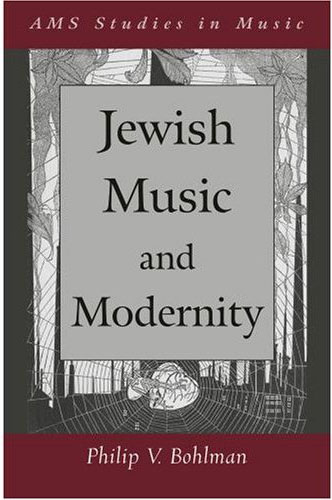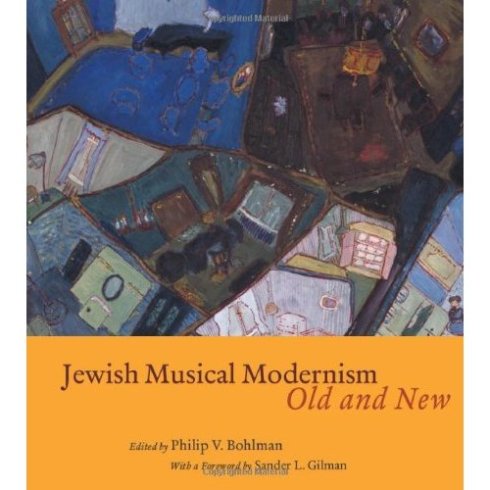You are currently browsing the tag archive for the ‘Cabaret’ tag.
Tag Archive
Jewish Music and Modernity
July 6, 2010 in Book Review | Tags: Arnold Schoenberg, Borders, Cabaret, Central Europe, Eastern Europe, Europe, Friedrich Holländer, Holocaust, Lisa Parkes, Modernity, Philip Bohlman, Popular Music, Sacred Music, Synagogue Music, Terezín | by jmfr | Leave a comment
Jewish Music and Modernity. Philip V. Bohlman. New York: Oxford University Press/AMS Studies in Music, 2008. xxxiii + 280 pp. ISBN 978-0-1951-7832-6
Discourse about “Jewish music” has traditionally raised complex questions about the identity of “Jewishness” in music. The ontology of “Jewish music” in modern Jewish history is as elusive as the nature of music itself. The reason for this, as Philip Bohlman argues in Jewish Music and Modernity, is that Jewish music in modernity exists not within a definable space or time, but rather at moments of disjuncture – in between regions, amid moments of transition and transformation, and at the border of ethnic, religious, and social boundaries. Jewish music, as an aesthetically autonomous object in Jewish society, was conceived of for the first time at the modernist moment, when Jews entered the public sphere of modern European society, broadening the purely ritualized devotional function that music formerly served. But the structural transformation that modernity brought about in musical culture had the paradoxical effect of confounding the very notion of “Jewish” music. Exposed to modern musical practices and genres in the non-Jewish public sphere during a period of political and aesthetic transformation, Jewish music became “Jewish” precisely in its confrontation with non-Jewish genres, forms, languages, and performers. Bohlman demonstrates that Jewish music, in responding to the political and aesthetic challenges of modernity, is inherently hybrid, unstable, and dynamic. It represents a dynamic site where national, ethnic, and gender identities are constructed and contested. Thus, borders between Jewish and non-Jewish became permeable, so that “musical repertories that for some were entirely Jewish—say, cabaret at the turn of the twentieth century—were not the least bit Jewish for others” (xvii). In other words, music participated in the transformation of modern Jewish identity itself.
Read the rest of this entry »
Jewish Musical Modernism, Old and New
June 22, 2010 in Book Review | Tags: Abraham Z. Idelsohn, Beta Israel, Cabaret, Charlotte Salomon, James Loeffler, Kay Shelemay, Michael Steinberg, Mitchell Ash, Modernity, Pamela Potter, Philip Bohlman, Richard Wagner, Sander Gilman, The Merchant of Venice | by jmfr | Leave a comment
Jewish Musical Modernism, Old and New. Edited by Philip V. Bohlman, with a foreword by Sander L. Gilman. Chicago: University of Chicago Press, 2008. 218 pp. with CD supplement. ISBN 978-0-226-06326-3
In his 2002 essay “Inventing Jewish Music,” Philip Bohlman called our attention to a surprising fact rarely noted by previous scholars: the term “Jewish music” hardly existed before the late nineteenth century [1]. Tracing its first appearance among German Jewish cantors, Bohlman argued that that the new locution reflected a crucial turning point in the emergence of modern Jewish historical consciousness as a whole. He has gone on to develop this thesis in various publications that emphasize the centrality of music in the modern European Jewish experience. In his new anthology, Jewish Cultural Modernism, Old and New, he now expands this line of inquiry from Jewish modernity to European modernism. His goal is to break down the familiar dichotomy between studies of modern Jewish music and those of individual Jewish musicians within the movement of European modernism. Read the rest of this entry »



